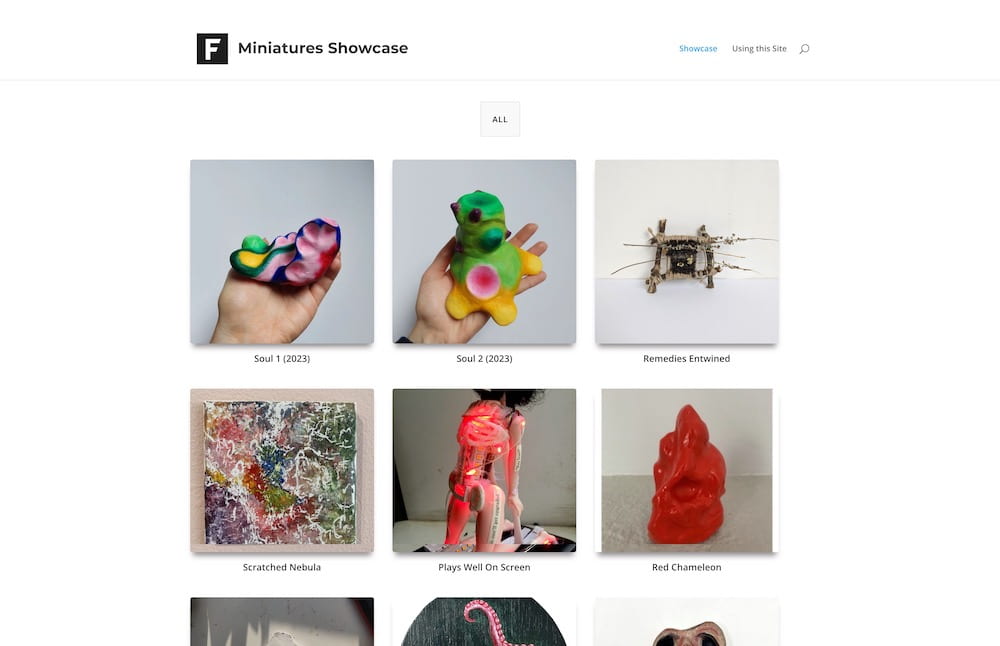
In response to multiple requests during the pandemic the Digital Learning Team developed a reusable template to facilitate exhibitions which has continued to be popular with staff and students thanks to its clean layout and simple use. One fantastic example, now entering its third consecutive year is the Miniatures showcase, an extra-curricular exhibition run both physically and digitally for Fine Art students and staff by Senior Lecturer Simon Clark.
This article aims to highlight the good practise of the Miniatures showcase journal and inspire future use of the Journal exhibition template in other disciplines. Journal is Falmouth University’s blogging platform, powered by an educational instance of WordPress called CampusPress. Journal is used for a variety of learning and teaching purposes across different disciplines in the University including personal scrapbooks, online portfolios, and multimedia forums.
In Simon’s own words “The Miniatures showcase is a virtual gallery featuring miniature artworks by fine art students across all 3 years (and some staff too). It supports a physical exhibition that is currently taking place in Grays Wharf gallery in Penryn.
It came about because the first miniatures exhibition we organised was postponed due to the pandemic. We decided to proceed with the exhibition virtually so that we could still celebrate the students’ work remotely during lockdown.”
Simon reflects on the benefits of continuing to run the digital showcase in parallel with the physical exhibition, now that the exhibition is in its third year and lockdown restrictions have lifted.
“…the first miniatures exhibition we organised was postponed due to the pandemic. We decided to proceed with the exhibition virtually so that we could still celebrate the students’ work remotely during lockdown.”
Simon Clark
“We’ve continued to use the showcase to support the physical exhibition for a number of reasons.
The showcase gives students a chance to see each other’s work in the build-up to the physical exhibition. I encourage students to upload their projects before the deadline so that they can start having critical conversations about their work before it goes on public display.
The showcase also cultivates a sense of community/participation. Students can be intimidated to submit work for a public facing show, but once they see their peers uploading work, they are more inclined to want to get involved.
The showcase also allows the curators to gather all the essential info about the artworks featured in the exhibition: names, titles, materials etc…
Finally, the showcase functions as a website for the exhibition. It allows students to provide links to social media and personal websites etc, and they can also share artist statements and further information about their specific projects.
We link to the showcase via a QR code on display at the physical exhibition. Members of the public have used this to get in touch with the artists directly, and a number of sales have been agreed in this way. And once the exhibition is over, the showcase holds all the documentation of the exhibition in one place. Each year the project comes around, I use the previous year’s showcase to promote the exhibition to students.”
“We link to the showcase via a QR code on display at the physical exhibition. Members of the public have used this to get in touch with the artists directly, and a number of sales have been agreed in this way.“
Simon Clark
It would have been easy to treat the digital showcase as a temporary solution during the pandemic, and return exclusively to the traditional physical exhibition when lockdown restrictions were lifted. But by evaluating and identifying the benefits of the showcase and continuing to run it in parallel, the digital showcase improves many aspects of the exhibition experience for organisers, artists and attendees.
Miniatures is a great example of Falmouth University’s blended approach to teaching, where successful online practises which were devised and piloted during the pandemic have been combined with traditional teaching to improve experiences for everyone involved.
The Exhibition Journal template is currently used in a number of Fine Art and Architecture courses for internal exhibitions and shows, providing an online space where finished or in progress work can be shared or displayed within a class, a course or beyond.
Get in touch with the Digital Learning Team if you’re keen to learn more or incorporate an online exhibition into your teaching.